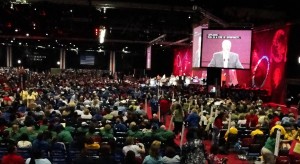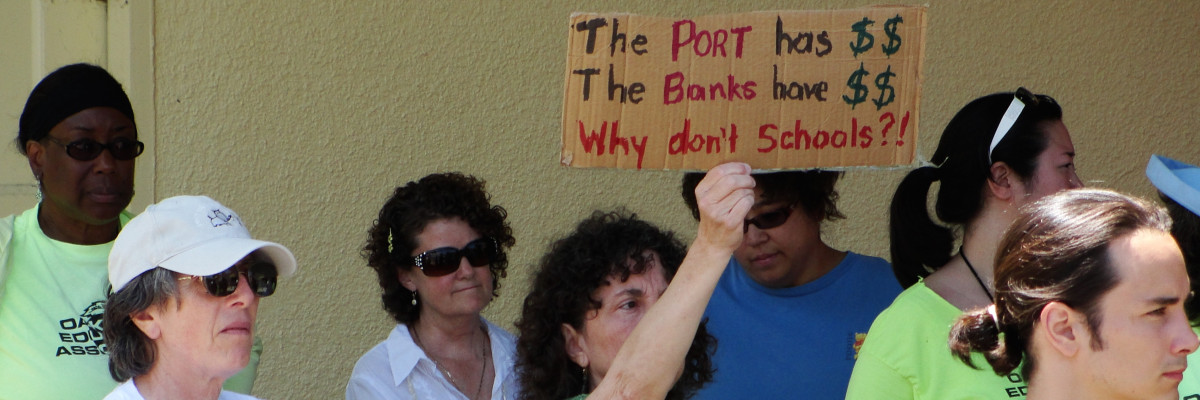
I’m as willing to compromise as the next “wild-eyed” radical. (“Wild-eyed” is what anti-teachers union blogger Mike Antonucci called several motions Oakland delegates brought to this year’s NEA Representative Assembly in San Diego.)
So after the California delegation voted on July 3 to oppose my proposal for a two-day nationwide strike for fully funded public schools I considered some options. Two relatively clear-eyed Oaklanders suggested two possibilities: (1) eliminating all references to “strike” and replacing them with “work action” or (2) keeping “strike,” but adding the option of a “work action as appropriate.” I chose the latter, since I wanted to promote debate about a political strike for full funding at corporate expense, to put the idea on the table. Meanwhile the new phrase, suggesting a broader range of possible collective actions, made clear that NEA affiliates would be free to choose tactics best suited to their conditions.
I submitted the modification to the wording of New Business Item 11 later that morning. It now began, “NEA will launch a massive media campaign this summer and fall, paving the way for a 48-hour locally-initiated, nationally-coordinated political strike or work action as appropriate and teach-in in January 2010.” (Italics added here to highlight the modified wording. The modified version of NBI 11 is here.) It turned out that the modification would provide a plausible, though ultimately futile, argument that the Representative Assembly should at least debate the proposal.
The RA’s agenda arrived at NBI 11 the next afternoon, on the heels of a lengthy Fourth of July celebration and exhortations by NEA President Dennis Van Roekel to fight hard for fundamental fairness. He brought delegates to their feet with these rhetorical questions: “Do our schools deserve adequate funding? Do our students deserve smaller class sizes? Do our students need art, music, and physical education?” A day earlier Van Roekel had challenged NEA delegates to push for “educational transformation.” Given such passionate calls to fight for educational justice, surely the NEA president would not squelch debate on a proposal to do just that.
In fact, in the two minutes allotted to argue for my motion, I planned to build on Van Roekel’s words. Here is what I’d written and mangaged, during rehearsals, to squeeze into a comfortable minute and 58 seconds:
NBI 11 proposes action to win:
- full funding for equal, quality education — including substantial class size reduction — at corporate expense,
- a bailout for students and working people, and
- an end to attacks on public education.
Here is the action proposed to take a significant step toward these goals: A media campaign and a 48-hour locally-initiated, nationally-coordinated political strike, or work action where appropriate, and teach-in just before Martin Luther King’s birthday in 2010.
Virtually every delegate I’ve talked with supports the goals outlined here. It’s the action that raises opposition. Yesterday President Van Roekel reminded us that everything we have we’ve had to fight for. And he asked us to believe in the power of NEA to bring about historic transformation of education. How did workers win the 8-hour day? It would never have happened without militant protest and nationwide strikes. How was major civil rights progress won? If leaders like Dr. King had heeded frequent criticism that direct action and civil disobedience were too much, too soon, it never would have happened. At an NEA forum Wednesday, author Michael Eric Dyson referred to this history in passionately supporting such nationwide direct action by teachers.
Real school reform will require trillions of dollars to transform educational conditions. Arne Duncan told us Wednesday “You’ve never seen $100 billion for education before and you’ll never see it again.”
More Americans than ever see the injustice of a twelve trillion-dollar corporate bailout as public services are cut. Only direct action of educators, students, and working people outraged by this injustice can win the resources required. With 3.2 million members and a $355 million budget, NEA is best positioned to lead this effort. We spend millions on more modest initiatives.
As President Van Roekel told us, now is the time to act. I hope today we will at least allow full discussion of this proposal and not consent to any move to block it. After hearing all the reasons against this NBI—consider the consequences of passing up this historic opportunity for real progress. We can’t afford NOT to try.
Unfortunately President Van Roekel called “Time!” thirty seconds before the two-minute time limit had expired (as later confirmed by a video recording), cutting off most of the last two paragraphs. Van Roekel ruled NBI 11 out of order, because, he said, it required NEA “to support illegal activity in our state and local affiliates, and NEA does not support illegal activities.” I challenged the chair’s ruling, because the NBI gave each local affiliate the ability to initiate a strike “or work action as appropriate.” Van Roekel still maintained that it was out of order. A voice vote overwhelmingly sustained his ruling.
If I’d I been allowed the full two minutes and to finish by urging delegates to “at least allow for full discussion of this proposal and not [to] consent to any motion to block it,” would the outcome have differed? Almost certainly not. The vote to get on with business-as-usual had been deafening.
Next: Where do we go from here? How can NEA move to fight hard for equal, quality education?
